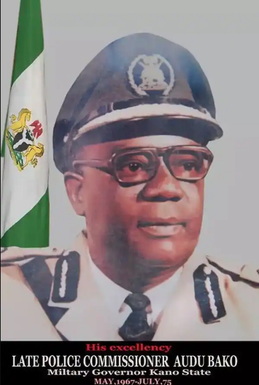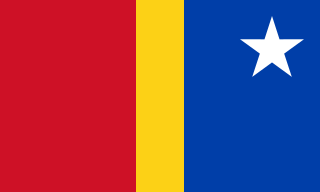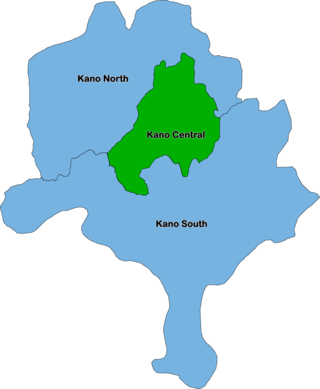
Kano is a city in northern Nigeria and the capital of Kano State. It is the second largest city in Nigeria after Lagos, with over four million citizens living within 449 km2 (173 sq mi). Located in the Savanna, south of the Sahel, Kano is a major route of the trans-Saharan trade, having been a trade and human settlement for millennia. It is the traditional state of the Dabo dynasty who have ruled as emirs over the city-state since the 19th century. Kano Emirate Council is the current traditional institution inside the city boundaries of Kano, and under the authority of the Government of Kano State.

Kano State is one of the 36 states of Nigeria, located in the northern region of the country. According to the national census done in 2006, Kano State is the most populous state in Nigeria. The recent official estimates taken in 2016 by the National Bureau of Statistics found that Kano State was still the largest state by population in Nigeria. Created in 1967 out of the former Northern Region, Kano State borders with Katsina State to the northwest, Jigawa State to the northeast, Bauchi State to the southeast, and Kaduna State to the southwest. The state's capital and largest city is the city of Kano, the second most populous city in Nigeria after Lagos. The incumbent governor of the state is Abba Kabir Yusuf. He was sworn in on 29 May 2023.

Jigawa State is one of the 36 states of Nigeria, located in the northern region of the country. Created on August 27, 1991, under the General Ibrahim Babangida who announced the creation of nine additional states in the country bringing the total number of states then to thirty. The announcement was given a legal backing through the; State Creation and Transitional Provisions Decree No. 37 of 1991. Jigawa State was a part of Kano State and was located in the northeastern-most region of Kano State, and it forms part of Nigeria's national border with the Republic of the Niger. The state capital and largest city is Dutse. Jigawa state has 27 local governments

Northern Nigeria was an autonomous division within Nigeria, distinctly different from the southern part of the country, with independent customs, foreign relations and security structures. In 1962, it acquired the territory of the British Northern Cameroons, which voted to become a province within Northern Nigeria.

Ado Bayero CFR, LLD, JP was the Emir of Kano from 1963 to 2014.
Haɗejiya is a Hausa town in eastern Jigawa State, northern Nigeria. The population was approximately 105,628 in 2006. Hadejia lies between latitude 12.4506N and longitude 10.0404E. It shared boundary with Kiri Kasama Local Government from the East, Mallam Maɗori Local Government from the North, and Auyo Local Government from the West. The Hadejia Local Government consist of eleven (11) political wards namely: Atafi, Dubantu, Gagulmari, Kasuwar Ƙofa, Kasuwar Kuda, Matsaro, Majema, Rumfa, Sabon Garu, Ƴankoli and Yayari. Inhabitant are dominantly Hausa, Fulani and Kanuri with some other groups such as Tiv, Yoruba, Igbo, Igala etc. The dominant occupation of the inhabitants is crop farming and animal rearing which a considerable percentage, engaged in trading, fishing and services including civil service. The people of Haɗeja are largely Muslims, although some follow indigenous belief systems. The town lies to the north of the Hadejia River, and is upstream from the Hadejia-Nguru wetlands. Hadejia is an internationally important ecological and sensitive zone.

Katagum is a town, a local government area and a traditional emirate in Bauchi State of north eastern Nigeria. The town is located on the northern bank of the Jama'are River, which is a tributary of the Hadejia. Most of the inhabitants are peoples from the Fulani, Kanuri, Karai-Karai and Hausa tribes. The chief agricultural products include peanuts (groundnuts), sorghum, millet, rice, cowpeas, cotton, indigo, and gum arabic. Livestock include horses, cattle, goats, sheep, donkeys and a lot of poultry.

Aminu Kano was a Muslim politician from Nigeria born at Sudawa, Gwale Local Government and resided at Gwammaja, Dala Local Government. In the 1940s he led a socialist movement in the northern part of the country in opposition to British rule. The Mallam Aminu Kano International Airport, the Aminu Kano Teaching Hospital, and the Aminu Kano College of Islamic Studies all in Kano, are named after him. He was a relative to the father of former Head of State Murtala Mohammed, former Minister of Defense Inuwa Wada and former Minister of Foreign Affairs Aminu Bashir Wali.

The Hausa are a native ethnic group in West Africa. They speak the Hausa language, which is the second most spoken language after Arabic in the Afro-Asiatic language family. The Hausa are a culturally homogeneous people based primarily in the Sahelian and the sparse savanna areas of southern Niger and northern Nigeria respectively, numbering around 76 million people with significant indigenized populations in Benin, Cameroon, Ivory Coast, Chad, Sudan, Central African Republic, Republic of the Congo, Togo, Ghana, Eritrea, Equatorial Guinea, Gabon, Senegal and the Gambia.
Kano State House of Assembly is the state legislature of Kano State, Nigeria. The Kano State House of Assembly is one of the arms of Kano State Government which comprises the Executives, Judiciary and the legislatives, House of Assembly are the legislatives of Kano State. The Chamber and the offices of the Members are located at Abdu Bako Secretariat in the state capital, Kano Municipal. The House of Assembly is currently under the Leadership of All Progressives Congress (APC). There have been nine different house of assemblies the very first one was inaugurated 2 October 1979 and the present one was inaugurated 7 June 2019. There are forty members of the State House of Assembly, that represent forty-four local government areas in Kano State.

Potiskum is a local government area and city in Yobe State, Nigeria. It's the most populous and fastest growing city in Yobe state and originally a home to about three major groups which include the Karai-Karai, Bolewa and Ngizim and Hausa-Fulani out of the several native languages of Yobe State. It is on the A3 highway at 11°43′N11°04′E. It has an area of 559 square kilometres (216 sq mi).

Audu Bako (1924–1980) was a Nigerian police officer and the first Governor of Kano State during the military regime of General Yakubu Gowon after the state was formed from part of Northern Region.

The Kano Emirate was a Muslim state in Northern Nigeria formed in 1805 during the Fulani jihad when the Muslim Hausa-led Sultanate of Kano was deposed and replaced by a new emirate which became a vassal state of the Sokoto Caliphate. During and after the British colonial period, the powers of the emirate were steadily reduced. The emirate is preserved and integrated into modern Nigeria as the Kano Emirate Council.

Hausa-language cinema, known informally as Kannywood, is the Hausa-language film industry of Northern Nigeria. It is based in Kano.
The Sultanate of Kano was a Hausa kingdom in the north of what is now Nigeria that dates back to 1349, when the king of Kano, Ali Yaji (1349–1385), dissolved the cult of Tsumbubra and proclaimed Kano a sultanate. Before 1000 AD, Kano had been ruled as an Animist Hausa Kingdom, the Kingdom of Kano. The sultanate lasted until the Fulani Jihad in 1805 and the assassination of the last sultan of Kano in 1807. The sultanate was then replaced by the Kano Emirate, subject to the Sokoto Caliphate. The capital is now the modern city of Kano in Kano State.
Government College, Birnin Kudu is a secondary school in Birnin Kudu, Jigawa State. Founded as a middle school in 1947 by the regional government, the college has some notable alumni. including five governors and industrialist Aliko Dangote.
Baffa Babba Danagundi, popularly known as Baffanyo, a Nigerian politician, former Majority Leader in the Kano State House of Assembly
The 2007 Kano State gubernatorial election occurred on April 14, 2007. ANPP candidate Ibrahim Shekarau won the election, defeating PDP Ahmed Bichi and 14 other candidates.

The 2023 Kano State gubernatorial election took place on 18 March 2023, to elect the Governor of Kano State, concurrent with elections to the Kano State House of Assembly as well as twenty-seven other gubernatorial elections and elections to all other state houses of assembly. The election—which was postponed from its original 11 March date—was held three weeks after the presidential election and National Assembly elections. Incumbent APC Governor Abdullahi Umar Ganduje is term-limited and cannot seek re-election to a third term. Abba Kabir Yusuf of New Nigerian People won the election.

The 2023 Nigerian Senate elections in Kano State will be held on 25 February 2023, to elect the 3 federal Senators from Kano State, one from each of the state's three senatorial districts. The elections will coincide with the 2023 presidential election, as well as other elections to the Senate and elections to the House of Representatives; with state elections being held two weeks later. Primaries were held between 4 April and 9 June 2022.













